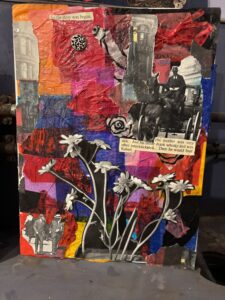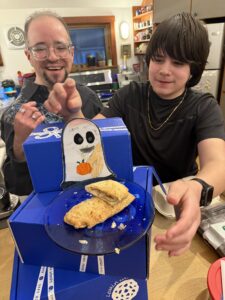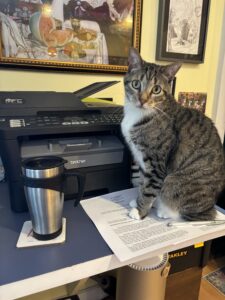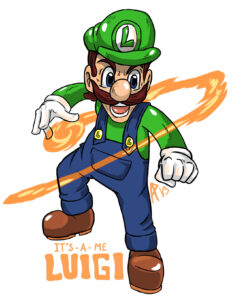Two months into the regime described by the Lawyers, Guns & Money blog as “Triumph of the Shill,” we hear the word “fiction” thrown around a lot as an insult, the devil on the shoulder whose nemesis is the angelic “fact”. At the same time, this administration seems grotesquely afraid of the ethical and historical truths that fiction and the other imaginative arts can reveal.
Neuroqueer author [sarah] cavar’s Substack alerted me to Hannah Kim’s Aeon article “The truth about fiction,” which explains that the metaphysical assumptions behind our genre classifications are not universal. In modern Western thought, fiction is distinguished from nonfiction because the latter is true and the former is invented. However, in classical Chinese literature, genre divisions pertained to the significance of the topic.
Analytic philosophy came to ask the questions it asks because it inherited the ancient Greek idea that some things are less ‘real’ than others. In Anglo-European philosophy, ‘fiction’ is closely connected to what’s imagined – that is, what isn’t taken to be real – because the tradition inherited the appearance/reality distinction from Plato. Fiction occupies the ‘appearance’ side of things, whereas nonfiction occupies the ‘reality’ side…
In cultures that don’t take on board a strong reality/appearance distinction, however, ‘fiction’ isn’t understood alongside ‘pretence’ and ‘imagination’ in contrast to ‘the real’. Just like their ancient Greek counterparts, Chinese metaphysicians sought to understand what the world is like and what explains the way the world is. But while the ancient Greeks posited an unchanging ultimate reality that transcends mere phenomena, the ancient Chinese believed that what is ultimate is immanent in the world, and that the Dao (道), the source of all things in the world, is itself constantly changing. This change-forward metaphysics led to a theory of fiction that didn’t contrast fiction against a stable, ‘real’ counterpart.
Recall how Plato relies on the appearance vs reality distinction to argue that what’s ‘really real’ (the unchanging Forms) are beyond our sense perceptions. Humans were meant to use the intellect, and not their senses, since sense data mislead us, while philosophising gives us a chance to grasp what’s beyond phenomena. In contrast, Chinese metaphysicians didn’t think ultimate reality is unchanging. Instead, the dominant view was that reality, including nature, follows consistent patterns (the Dao). What is ‘empty’ or ‘unreal’ was seen as the generator of all things, and all things were considered equal in significance since they are all manifestations of changing patterns…
… Since Chinese metaphysics didn’t posit a fixed, transcendent reality, reality was understood to be an ever-changing process, and so the categories themselves couldn’t be based on inherent, necessary or fixed essences but on functions and behavioural tendencies. The difference between discourses labelled ‘xiaoshuo’ [fiction] and ‘great learning’ (Confucian classics and histories) wasn’t that one is unreal or imagined while the other is real. All discourse was understood as an account of the world, and the difference between ‘small talk’ and ‘great learning’ was the extent to which it was adopted to organise how people lived.
Kim argues that beneath our supposedly objective tests for fiction versus fact, the genre border is a political battleground. Classifying a work as fiction can allow more leeway for controversial takes on current issues…or it can be a rhetorical device to undermine narratives that challenge us.
cavar is editor-in-chief at manywor(l)ds, an online journal of creative writing by neurodivergent, queer, disabled, and Mad writers. I learned a lot from this poem in Issue #7, “plurality: a personal primer,” by rose& elysium. The author(s) are members of a plural system, i.e. several personalities sharing the same body.
…many professionals promote final fusion, becoming a singlet,
as the ideal outcome for Plurals; to us, it’s a nightmare, another
type of conversion therapy entailing the fundamental loss
of separate, functional identities as we would merge into
an “original” self, a singlet who none of us remember being…
Plurality threatens Western metaphysical beliefs about the One being more perfect than the Many. A lot of psychiatric professionals are too uncomfortable with that critique.
Lu Chekowsky’s essay in Pigeon Pages, “How Sex Work Prepared Me for a Career in Advertising,” has sharp humor with the ring of truth. The hermit crab structure of a resume adds to the satirical edge.
I make you want what you are supposed to want: love, clear skin, acceptance, white teeth, redemption, a flat stomach, fame.
I separate you from your money, time, and the disappointing truth of your life.
I get you off and get inside you. I sell fantasy as a product.
I make promises that I know I can’t keep, even while I’m making them. You can be happy. You can be wanted. You can have everything.
I’m invisible and exactly who you want me to be. I have the right face, the right ass, the right words, ready to deploy at any moment. I construct aspiration with the very best lighting. I make ugly things beautiful. I tell stories that let you sleep at night.
Because of me, you believe the dreams you have are your own.
March Xness, the tournament of literary essays about pop songs, took a break from competition this year to showcase a month’s worth of favorite first-round losers from previous years. Writing about the song “She’s Like the Wind,” Erin Vachon’s “Swayze ode to queer failure” won my heart yet again. “Dirty Dancing,” like “Jurassic Park,” was one of those iconic Gen-X movies that I only watched for the first time recently, when I had the tools to perceive its gender-expansive subtext. (Dr. Ian Malcolm will forever be a trans man in my head canon. Life finds a way!)
Take an hour out of your doomscrolling to watch this interview with novelist Robert Jones Jr., author of The Prophets, on Wesley Dixon’s Vassar College series Conversations @ the Salt Line. The Prophets is a brilliant, beautiful, tragic, yet inspiring novel about two enslaved young men in love and how the purity of their relationship disrupts the plantation’s ethos of sexual exploitation. The interview touches on such topics as having empathy for your villain characters and recovering the history of queer-affirming and gender-expansive African cultures before colonization.
Need something lighter? Check out Elizabeth Zaleski’s playful essay “Hung Up” at The Missouri Review, a compendium of penises she has known and their importance, or lack thereof, in her relationships with the men attached to them. If you’re more of a back-end person, see “Great Farts of Literature”.












